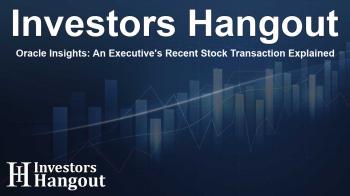Oracle Insights: An Executive's Recent Stock Transaction Explained

A Significant Insider Transaction at Oracle
Recently, it was brought to light that Naomi O Seligman, a Director at Oracle (NYSE: ORCL), executed a substantial insider sale, as indicated by a filing with the Securities and Exchange Commission (SEC).
Details of the Sale
The SEC filing revealed that Seligman sold a total of 2,222 shares of Oracle, amounting to a significant value of $641,958. This transaction has garnered attention as it provides insights into the confidence levels within the company.
Oracle's Market Performance
As of the recent trading day, Oracle shares have shown a slight increase, up by 0.18%, and are currently priced at $281.76. Such fluctuations in stock prices can often signal investor sentiment and market dynamics.
Understanding Oracle’s Business Model
Oracle has established itself as a leader in providing enterprise applications and infrastructure solutions globally. Their offerings include on-premises and cloud-based solutions, serving a diverse range of industries. Since its inception in 1977, the company has continuously innovated, originally creating the first commercial SQL-based relational database.
Diving into Financial Performance
Revenue Growth: Oracle has recently demonstrated impressive revenue growth, reporting an increase of 12.17%. While this is commendable, it still lags behind many competitors in the Information Technology sector, where the average growth rate is notably higher.
Analysing Earnings Metrics:
- Gross Margin: Currently, Oracle is experiencing challenges with a gross margin of 67.28%, indicating potential struggles in maintaining profitability relative to industry peers.
- Earnings per Share (EPS): The company's EPS stands at 1.04, which is below the industry average and might suggest some underlying issues with earnings performance.
Addressing Debt Management: Oracle’s debt-to-equity ratio is reported at 4.36, which exceeds the industry average, indicating a higher financial risk landscape that requires careful management.
Valuation Insights:
- Price to Earnings (P/E) Ratio: With a P/E ratio of 65.1, Oracle appears to present an attractive valuation, potentially offering a solid buying opportunity for investors.
- Price to Sales (P/S) Ratio: At 13.73, the stock's P/S ratio suggests it could be undervalued, appealing to those investors focusing on sales growth.
- EV/EBITDA Analysis: The ratio stands at 36.44, which is lower than average, further reinforcing the notion that Oracle might be undervalued in the current market.
Market Capitalization Overview: The company's strong market capitalization demonstrates its significant presence in the industry and reflects its ability to compete effectively across various sectors.
Understanding the Implications of Insider Transactions
While insider transactions can provide valuable insights, they should not be the sole factor guiding investment decisions. Evaluating these transactions alongside other financial metrics is crucial.
An insider is typically defined as any officer, director, or significant shareholder of a company, which may include executives and major hedge funds. They are obligated to report their securities transactions to maintain transparency.
Positive signals can arise from insider purchases, often seen as a prediction of stock appreciation; however, insider sells may occur for various personal or financial reasons that do not necessarily reflect a bearish outlook.
Transaction Codes and Their Importance
Investors focus on transaction codes detailed in SEC filings. For example, a P indicates a purchase, while an S shows a sale. Understanding these codes can provide deeper insights into insiders' activities and their potential impact on stock performance.
Frequently Asked Questions
What does the insider sale by Naomi O Seligman indicate?
The insider sale may suggest personal financial management decisions rather than concerns about the company's outlook.
How can Oracle's performance impact investors?
Financial metrics such as revenue growth and earnings may influence investor confidence and future stock performance.
Why is the P/E ratio important?
The P/E ratio helps determine if a stock is valued appropriately for its earnings potential, guiding investors in their decision-making process.
What are the risks associated with Oracle's debt management?
A high debt-to-equity ratio indicates potential financial risk, suggesting that the company may face challenges in meeting its obligations if financial health declines.
How frequently should investors review insider transactions?
Keeping an eye on insider transactions can help investors gauge confidence levels among executives and make informed investment choices.
About The Author
Contact Addison Perry privately here. Or send an email with ATTN: Addison Perry as the subject to contact@investorshangout.com.
About Investors Hangout
Investors Hangout is a leading online stock forum for financial discussion and learning, offering a wide range of free tools and resources. It draws in traders of all levels, who exchange market knowledge, investigate trading tactics, and keep an eye on industry developments in real time. Featuring financial articles, stock message boards, quotes, charts, company profiles, and live news updates. Through cooperative learning and a wealth of informational resources, it helps users from novices creating their first portfolios to experts honing their techniques. Join Investors Hangout today: https://investorshangout.com/
The content of this article is based on factual, publicly available information and does not represent legal, financial, or investment advice. Investors Hangout does not offer financial advice, and the author is not a licensed financial advisor. Consult a qualified advisor before making any financial or investment decisions based on this article. This article should not be considered advice to purchase, sell, or hold any securities or other investments. If any of the material provided here is inaccurate, please contact us for corrections.

